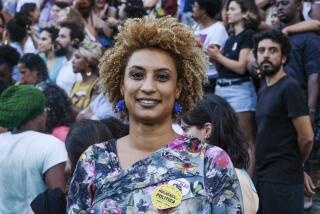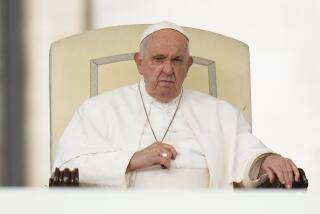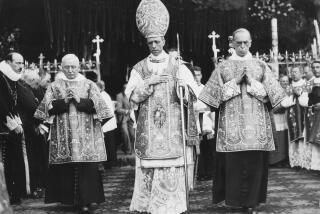Mushroom-Hunting Alibi Aroused Suspicion, Polish General Testifies
- Share via
WARSAW — A Polish secret police general testified in court Monday that he led a nationwide investigation into the abduction of slain Father Jerzy Popieluszko for three days before suspecting that his own men were responsible.
Doubts began to grow, Gen. Zenon Platek said, when one of his officers admitted taking a police car to the vicinity of the kidnaping on Oct. 19--the day the priest disappeared--but insisted that he used the car to go mushroom hunting.
Platek, testifying on the 16th day of the trial of four secret police officers charged with Popieluszko’s murder, said he launched a major investigation of the case in the belief that it was either a “political provocation” or an “attempt to get money” by ransom.
Pietruszka suggested that the general ordered him to lie to throw investigators off the track.
He also said that Archbishop Bronislaw Dabrowski, the secretary of Poland’s Roman Catholic episcopate, had assured him in a telephone call in early October that the controversial pro-Solidarity priest, whose inspirational sermons won him a following of millions, would be sent to Rome for prolonged study. Platek said he passed the news “with unconcealed joy” to his deputy, Col. Adam Pietruszka, and other Interior Ministry officials that the Popieluszko problem had been solved by the church itself.
The 58-year old general headed the security department targeted on Poland’s influential Catholic church until Nov. 2, when he was suspended for failing to exercise adequate supervision. Platek has not been charged in the case. The same day he was suspended, his deputy, Pietruszka, was arrested on charges of aiding and abetting the murder and attempting to cover up the involvement of his subordinates.
No Motive for Killing
Pietruszka has pleaded innocent and implied that he had no motive for encouraging the priest’s murder because Platek had told him Father Popieluszko was to be sent out of the country.
The general was the most senior official to testify so far in the trial, which has cast unprecedented light on the inner workings of a Soviet Bloc country’s political police. The government is believed to be using the open trial as a means of disciplining Poland’s powerful security apparatus.
As the trial resumed after a weekend adjournment, a leading Polish newspaper indicated for the first time that public blame for the murder may not be carried beyond the four officers who are now on trial.
Testimony of the past week “confirms . . . assumptions regarding the lack of other, still unknown participants or instigators” of the crime, said a commentary in Trybuna Ludu, the Communist Party newspaper.
“There is nothing in the testimony by the defendants, or court proceedings to date, that would indicate there were still other persons apart from the four defendants who intentionally encouraged, ordered or endorsed the illegal operation,” the newspaper said.
It noted, however, that the trial is not over yet and added that “it would be premature to formulate categorical statements on the matter.”
The Four Defendants
In addition to Col. Pietruszka, 47, the defendants are Capt. Grzegorz Piotrowski, 33; Lt. Leszek Pekala, 32, and Lt. Waldemar Chmielewski, 29. They face possible death sentences if convicted.
Repeated statements by senior Polish officials that the search is continuing for possible instigators of the murder have kept alive public suspicions that others may be publicly exposed. The government spokesman, Jerzy Urban, raised the possibility that higher officials will be named in trial testimony.
The captain and two lieutenants have testified that they believed at the time that they were acting under orders relayed through Col. Pietruszka from a higher level, probably that of a deputy minister of interior. Capt. Piotrowski said he assumed the orders to attack Father Popieluszko came from Deputy Minister Wladyslaw Ciaston, head of the Polish security service, but that he now understands this to have been an “illusion.”
There has been no indication that Ciaston will be called to testify.
Gen. Platek, dressed in a gray business suit, told the court that his suspicions began three days after the priest’s kidnaping. Piotrowski, he said, provided an unconvincing explanation of his activities the day the priest was taken from his car on a highway near the northern city of Torun.
It was only then, the general said, that he learned for certain that a car from Piotrowski’s department had been noticed by police in the vicinity of Popieluszko’s abduction.
Gen. Platek said he summoned his deputy, Col. Pietruszka, and told him that the captain had to provide a written explanation of his activities on Oct. 19. When the officer’s written reply came back, asserting that he had used a ministry car on a mushroom-hunting trip, “then it was suspicious,” Platek said.
Even so, he said, he failed to suspect the involvement of his own deputy virtually until the moment of Col. Pietruszka’s arrest on Nov. 2, two weeks after the murder.
“Nearly until the end, I was giving orders to him, and I had no suspicions,” Platek said.
In his own testimony, Pietruszka suggested several times that the general ordered him to lie to throw investigators off the track, and to move the kidnap car from a ministry parking lot in Warsaw to prevent its discovery. Piotrowski, Polish newspapers and one of the judges have accused the colonel of lying.
A second witness, Capt. Piotrowski’s secretary, joined the list of accusers Monday, saying that under orders from Col. Pietruszka, she rewrote an incriminating statement for investigators on Oct. 23. She said he wished to delete a passage that made clear that Pietruszka knew in advance where the captain would be on the day the priest disappeared.
The secretary, Barbara Story, wept as she described Pietruszka as a “vicious” man. “I was afraid of Pietruszka,” she said.
More to Read
Sign up for Essential California
The most important California stories and recommendations in your inbox every morning.
You may occasionally receive promotional content from the Los Angeles Times.













